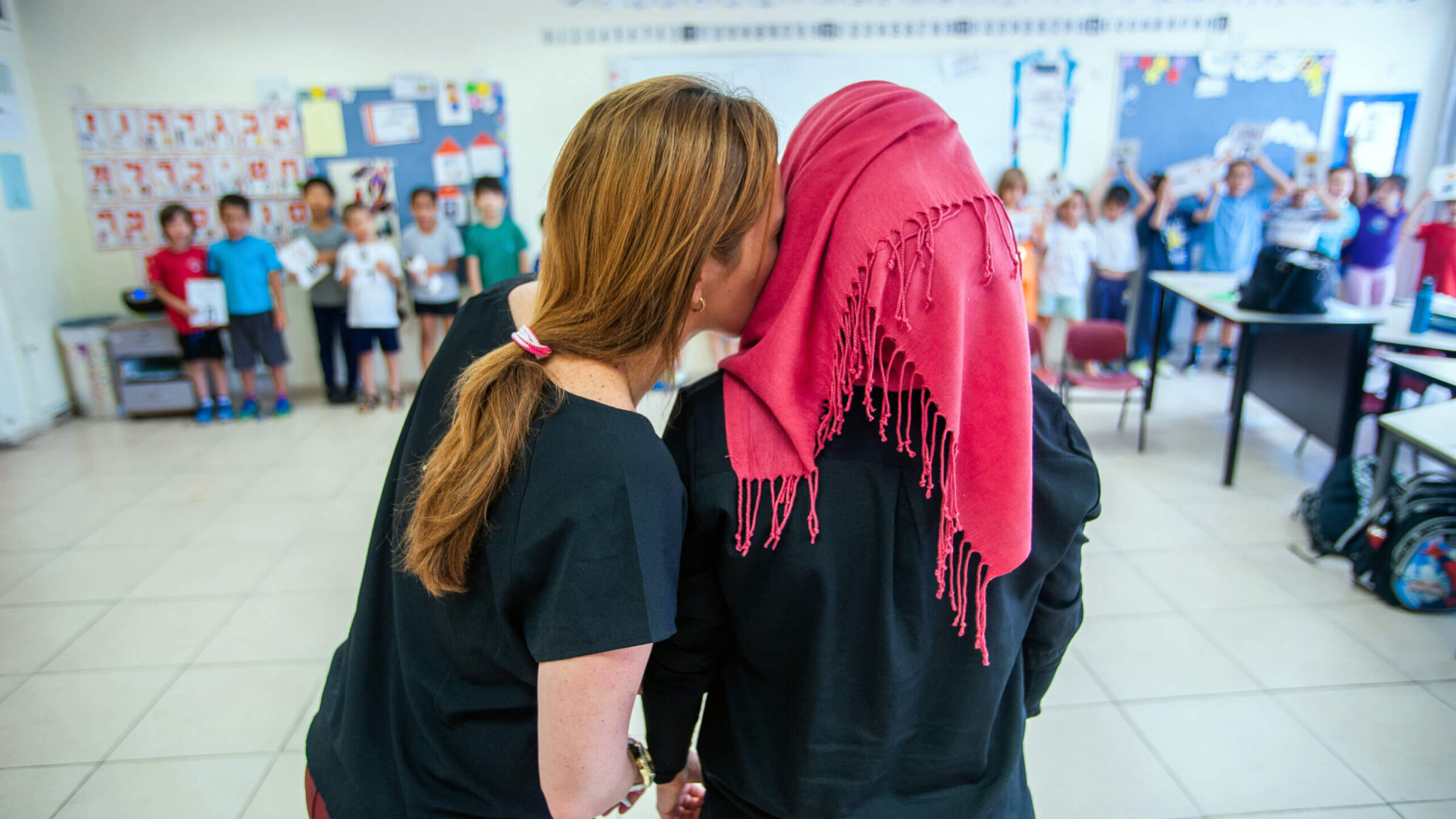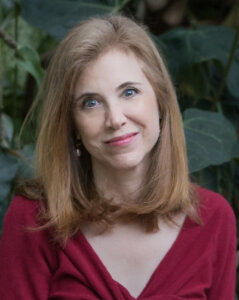A chance encounter with an Arab woman during the war has taught me the power of grieving together
There is more opportunity for compassion in private conversations than the public square

Arab and Jewish Israeli teacher’s Rinat Levi and Arin Ismael working with their Kindergarten class to perfect the performance for the schools ‘Identity Day’ celebrations at the mixed religion school of Hand in Hand on June 1st, 2016 in Jerusalem, Israel. Photo by Craig Stennett/Getty Images
Every week I go to the Andala Café, a Palestinian coffee shop in Cambridge, Massachusetts. I love the place because it captures the spirit of old Jerusalem, with tea served on brass trays and the sweet scent of hookah pipes in the air. It is my usual haunt and I need to see familiar faces in this tragic time, since Hamas attacked Israel on Oct. 7. Still, I have begun wearing a Jewish star among the women in kaffiyehs and hijabs, as if to announce I am both a stranger and a friend.
As a journalist, I have been writing about human rights and religion for four decades. This week I looked to my community of scholars, religious leaders, and activists for analysis and comfort. But a spontaneous conversation with an Arab college student at Andala would teach me far more about the power of listening to words shared privately that are rarely said publicly.
Our news feeds may show faces of different perpetrators and lives lost. But the social media we post and banners we fly do not always reflect our inner conflicts or the compassion for people we call “enemies.”
On the first day of the Israel-Hamas war, I saw Sami Herbawi, the shy Palestinian owner with tousled, gray hair. His family, I had learned earlier, had sheltered Jews during the 1929 Hebron massacre. “You will always be welcome here,” he said after a hug. “You’re family.” We would talk later, we promised. Right now, we were too raw.
Like Herbawi, I am a staunch critic of the Israeli government, but I love Israel, and I am horrified that many Arabs, including university students, celebrated a massacre of Jews as a victory.
I went to Andala again the next week for breakfast. I compulsively checked my phone every couple of minutes, lest I miss a moment of the crisis unfolding. Then a customer who looked to be in her mid-20s came up to me. She introduced herself as a college student from a Middle Eastern family. “You were the Jew who hugged Sami the other day,” she said. “I was sitting nearby. I want to know how you’re feeling.”
I was startled, but invited her to join me.
Her anguish was keeping her up at night, she told me. She was feeling “unimaginable pain” about the death toll in Gaza. Still, she said, the Palestinians speaking out at public rallies were not the whole story.
The pictures of slain Israelis haunted her, she explained, particularly the photographs of children. She deplored all death, she told me.
“I hate Hamas,” she said, though she had gone to rallies with people who failed to denounce the group. “All my friends hate Hamas. It’s a terrorist organization. They killed Israeli civilians and are willing to risk the lives of Palestinian civilians.”
“Then why don’t you talk about that publicly?” I asked.
“If I rejected Hamas out loud it would seem as if I didn’t care about my own people,” she said. People would assume she wasn’t outraged about the “open air prison” in Gaza and the killing of children by Israeli soldiers. “I don’t want to lose my community.”
“But why do you attend rallies with people who celebrate the slaughter in Israel as a win?” I asked.
Hamas is the only group fighting for the Palestinian people, she said.
She knew she contradicted herself. But she lives in a state of inner conflict. “Sometimes I ask myself, ‘Do I care about the death of Israeli children?’ Of course I do!” It was horrifying to her that she would even wonder, she said. It made her question her own humanity.
I told her I, too, live with competing emotions and worry about alienating my more conservative Jewish friends. A Hasidic friend of 30 years once accused me of not caring about Jewish blood because I had criticized the Israeli government’s treatment of Palestinians. I told her I was angry at myself for remaining silent this week when some Jewish friends have vilified all Palestinians, justifying their hatred in the face of unspeakable loss.
She doesn’t want to lose her Palestinian friends. I don’t want to lose my Jewish friends.
For more than an hour, we talked about how the news feeds of Arabs and Jews look entirely different. Hers is full of videos of Israeli soldiers vowing to kill any Palestinian in sight. Mine is picture after picture of murdered Israelis.
She had many questions for me about Jewish history and religious law, such as: “What does the Torah say about owning land?” We concluded by talking about how the current Israeli government has exacerbated the wretched conditions under which Palestinians live. I told her I was devastated by Prime Minister Benjamin Netanyahu’s call for a mass evacuation of Palestinians from the north of the strip — the impossibility of moving 1.1 million people in 24 hours, the lack of food, water and medical supplies and, most of all, the prospect of a civilian bloodbath.
I wonder if our conversation will continue the next time we run into each other at Andala, as death tolls mount and our news sources show competing faces of brutality. Will we be able to retain our compassion for one another? Will we still be able to connect amid so much suffering? But for now, it is enough that we had the opportunity to share our truths as Arab and Jewish women.
We both wanted to talk and listen to each other, before the sound of bombs drowns us out. We were strangers and yet also family, grieving together over hummus and tea.
To contact the author, email [email protected].

















